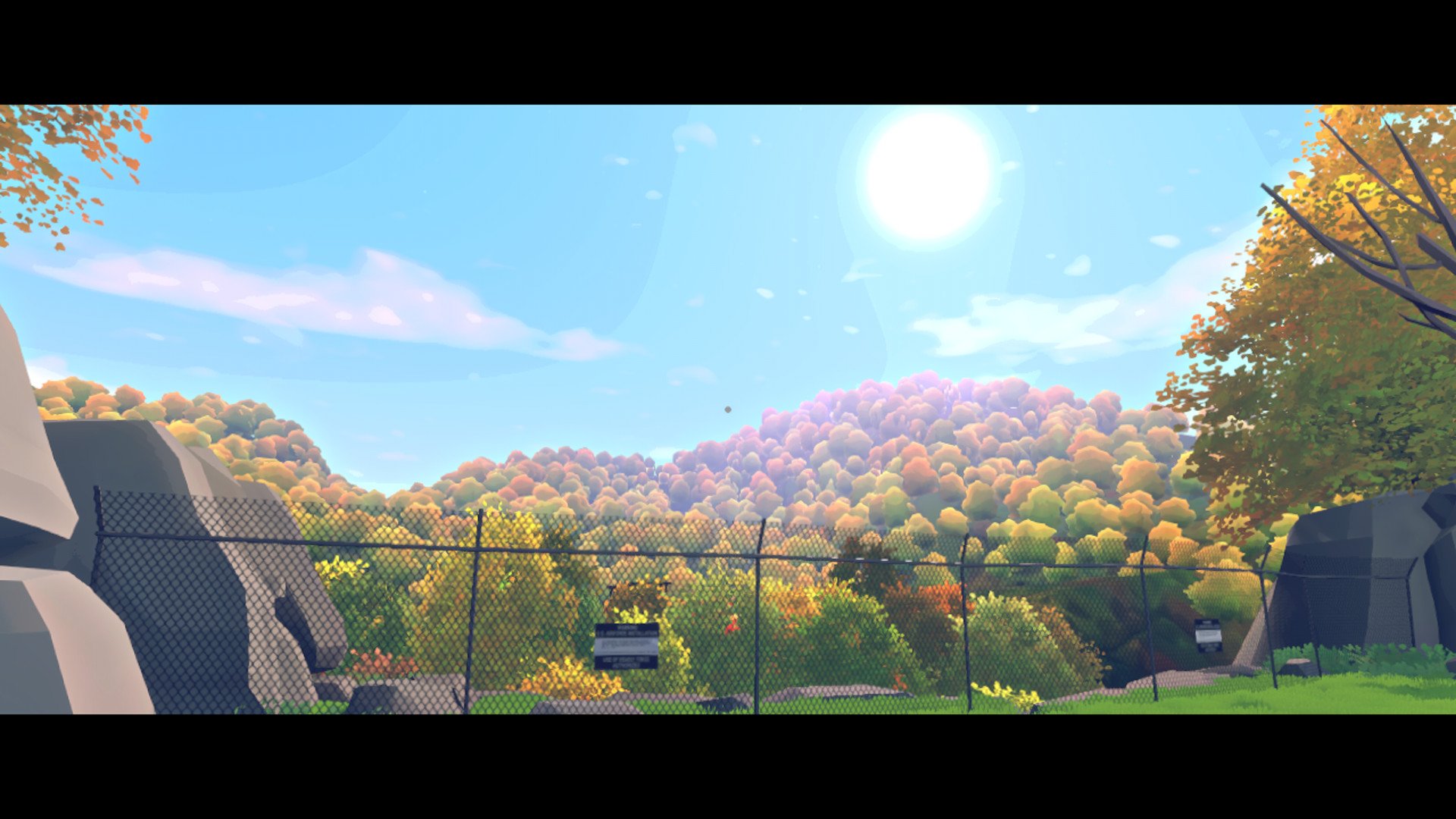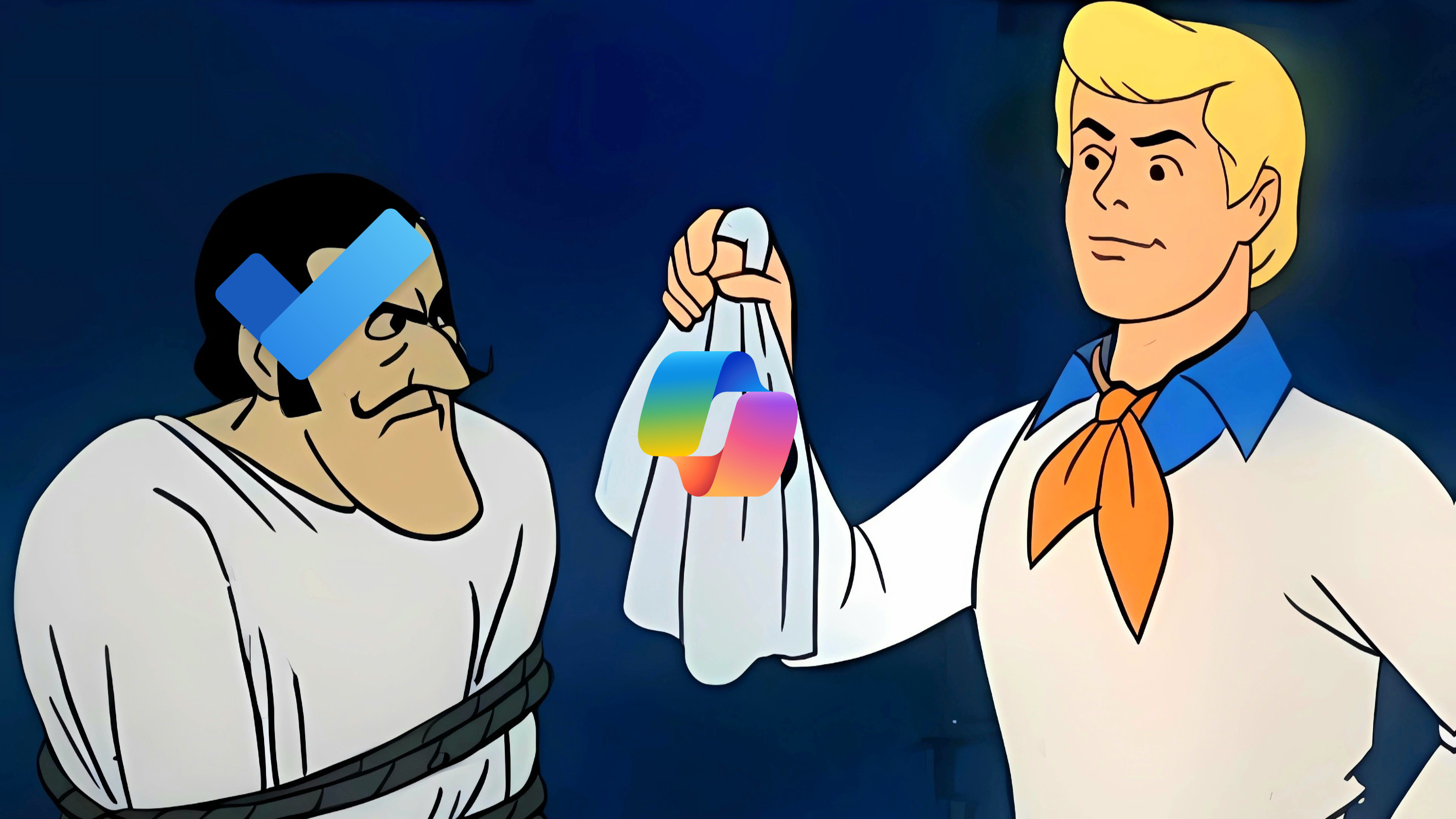
Virginia, developed by Variable State and published by 505 Games, is a single-player first-person thriller mystery. And it's probably the weirdest thing I've ever played.
This game, (respectfully) if you can call it that, opens the same way we would have seen crime movies open in the 80's. The opening credits are that. Credits playing during an opening sequence, just as if you were watching the James Bond opening titles. Virginia is presented in a widescreen letterbox format, with the black bars, indeed emphasizing the feeling you're not so much playing a game, more you're directing the lead character in a film.
Once the opening credits had rolled, I was taken aback by the simplicity of the design. Everything was minimalist in its look, nothing was overly decorated, and there was very little detail. You didn't feel like it was needed. Kingdom in Virginia, where the story is set, feels like it's a small town. People who have seen the film Fargo, or seen Twin Peaks will already feel a familiar tug. A small mountainous town? Something odd is bound to happen there!
A small mountainous town? Something odd is bound to happen there!
We're introduced to our character, Anne Tarver, who is fresh from the FBI training academy and is set to investigate her new partner, Maria Halperin, both who are black women. These are the only sure things I can ascertain from the storyline; the rest is pieced together from what I felt I saw.
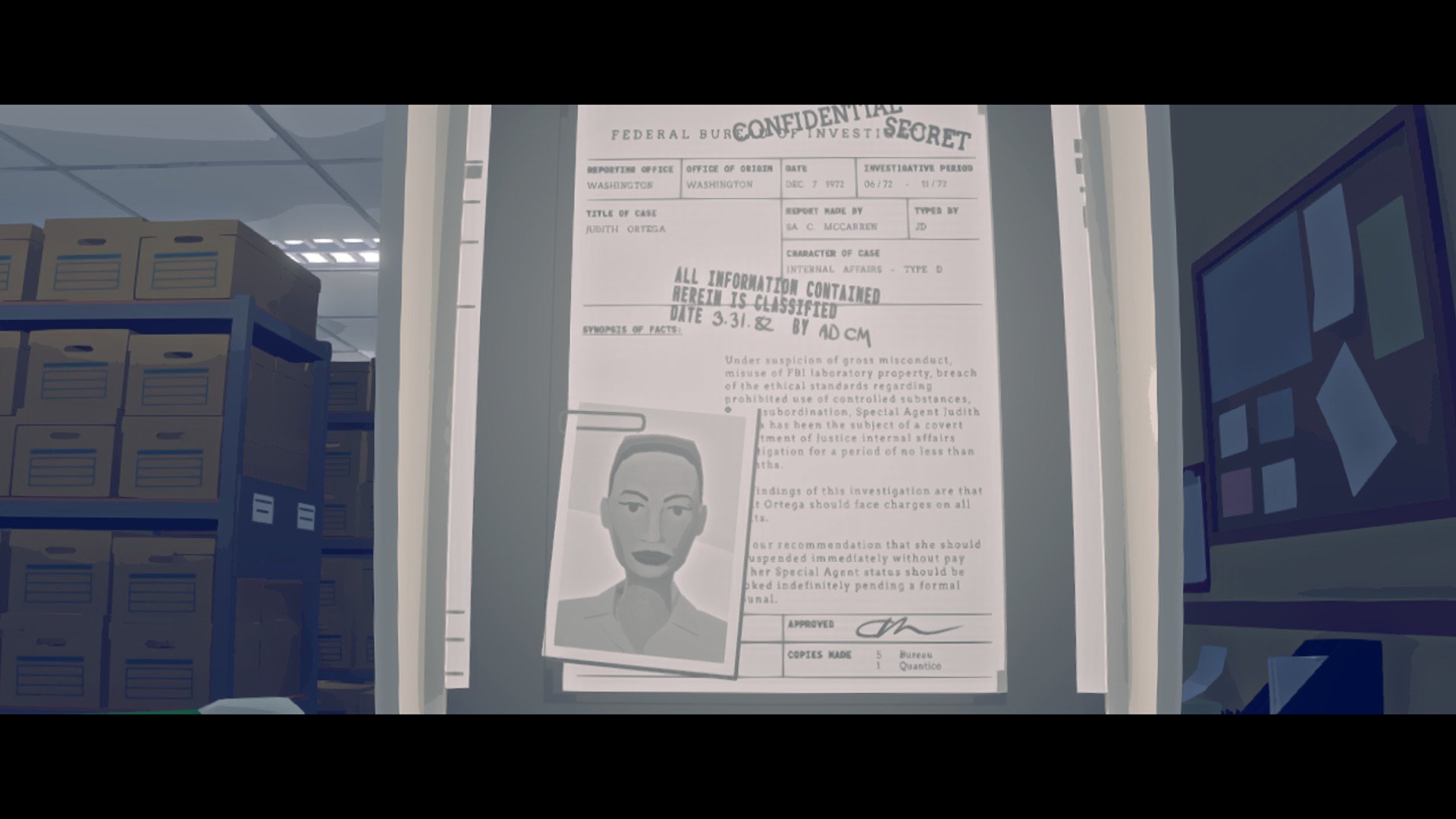
There are questions that will remain unanswered since no-one says a word throughout the entire game. It plays as though you're watching a silent-movie of old, with a beautiful score played by the Prague Philharmonic Orchestra. Instead, the tone and the pace are rather set by the music. It tells you when you should be feeling like something exciting is happening, even if you're not entirely sure exactly what that is? The plot is very interpretive, which means people could decide something happened for an entirely different reason, or they drew a different conclusion. Did that drop of the head say the person was sad and defeated? Or were they angry?
It's also somewhat difficult to interpret their faces, as the characters look like a slightly less polished version of an Xbox Avatar. This stylistic choice is obviously to make the player focus more on the emotion behind the scenes, but sometimes the scenes are so nonsensical, that it makes no difference anyway. You'll try to read between the lines, regardless. You'll be greeted with smiling friendly faces one moment, and find yourself being stonewalled the next.
There are questions that will remain unanswered since no-one says a word throughout the entire game.
A rapid succession of cuts shows Anne moving up through the ranks of the FBI -- was this a flashback, or a flash forward, or a daydream? That kind of context, which is lacking in this instance, makes it tough to interpret what that sequence we just saw was. It's difficult to know where you stand with the game when you have so many different options to make a choice from, and they're all ideas that you've put in your head. Regardless of which angle, we look at these flashes from, the lack of context often just makes them confusing. What is the relevance of anything we're being shown if we don't know why we're being shown it? And given that Virginia is a stand-alone game, if a movie or a TV show had done the same thing, you'd want answers. You'd want a Directors Cut, so you understood what things meant. You'd want another episode to move the plot along so you can piece together what everything that came before said. It leaves you wanting more but in a little bit of an unsatisfying way. Virginia plays its cards very close to its chest.
All the latest news, reviews, and guides for Windows and Xbox diehards.
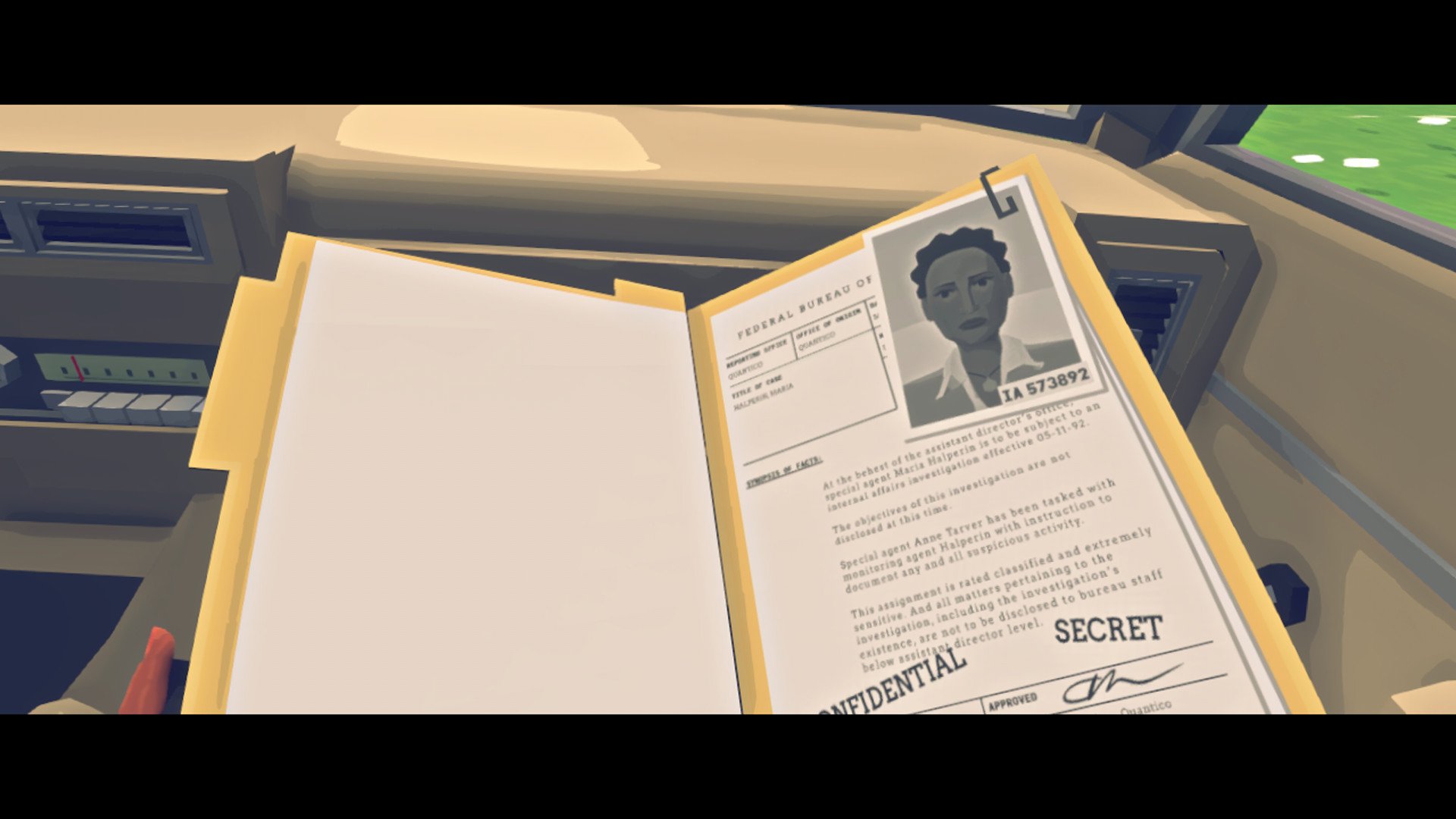
While there are hidden extras to find, they are often so far off the beaten path, or beyond the realms of where you're expected to spend the majority of your time, which by the time you've learned the lesson not to look for things, those things are starting to appear in the game. You're caught in a dichotomy of being told that you don't need to explore but just focus on the game and achievement hunting which not only throws some horrific odd numbers into your perfectly rounded gamer score but also require you to be exploring and picking things up. Taking time out to search for the things that are achievement related stalls the pacing of narrative and even if you pick certain things up, it doesn't mean you'll unlock the achievement attributed to that item.
It's cause and effect that make Virginia so obscure because there are big chunks of information missing.
For example, there is a point in the game where Anne returns home, and in normal circumstances, you'd just push forward and move into the room. But in this instance, you're standing on a flyer ad, but you wouldn't know if you didn't pan the camera to the floor and look down first. If you pick the flyer up, later a train set will appear in her apartment, but the achievement doesn't pop unless you go up to the train set and look specifically at it. Another example is picking up a red bandanna in a bar, and then an hour later into the game, specifically looking at a waitress in another location who is wearing it. It's those kinds of cause and effect things that make Virginia so obscure because there are big chunks of information missing. You find a bandanna in a bar, then you pick it up, and later a waitress has it? Why? Are we friends? Was she having a bad hair day, and I took pity on her? The same with the train set. Why does a woman decide having a huge train set in her bedroom is a good idea?
The achievements available offer no clues how to unlock them, giving only a tag-line and absolutely no specifics, so it's entirely possible you pick something up without realizing what it relates to and still unlock one.

The obscurity increases in intensity towards the end of this romp of fewer than three hours. In the beginning, things felt comfortable. You felt in control. You could help Anne apply her lipstick as she prepares to receive her FBI badge, move her to the line. Yet Virginia implements jumps in time to help speed things along. Rather than rendering an entire building with a passageway for Anne to move through as she makes her way outside, the game just cuts as you make progress through the hall. First, you're walking down a corridor, then a stairwell, then the basement. This makes it feel like a film even more. Gradually you begin to find yourself just washed along with the narrative.
Virginia is a game that wants to be deep, and to some degree is, but it feels unfinished purely because of the questions it leaves behind.
There isn't much, in my opinion, that gives away any paranormal undertones like we've come to expect from shows like Twin Peaks or the X-Files, apart from the general oddity. Virginia is a game that wants to be deep, and to some degree is, but it feels unfinished purely because of the questions it leaves behind. At first, we're investigating a missing person case, which leads to the father being arrested, released, slapped but why? What are we supposed to infer from the father being a religious figure? There are times when we discover we were assuming the role of someone else during a sequence, and these come with no warning.
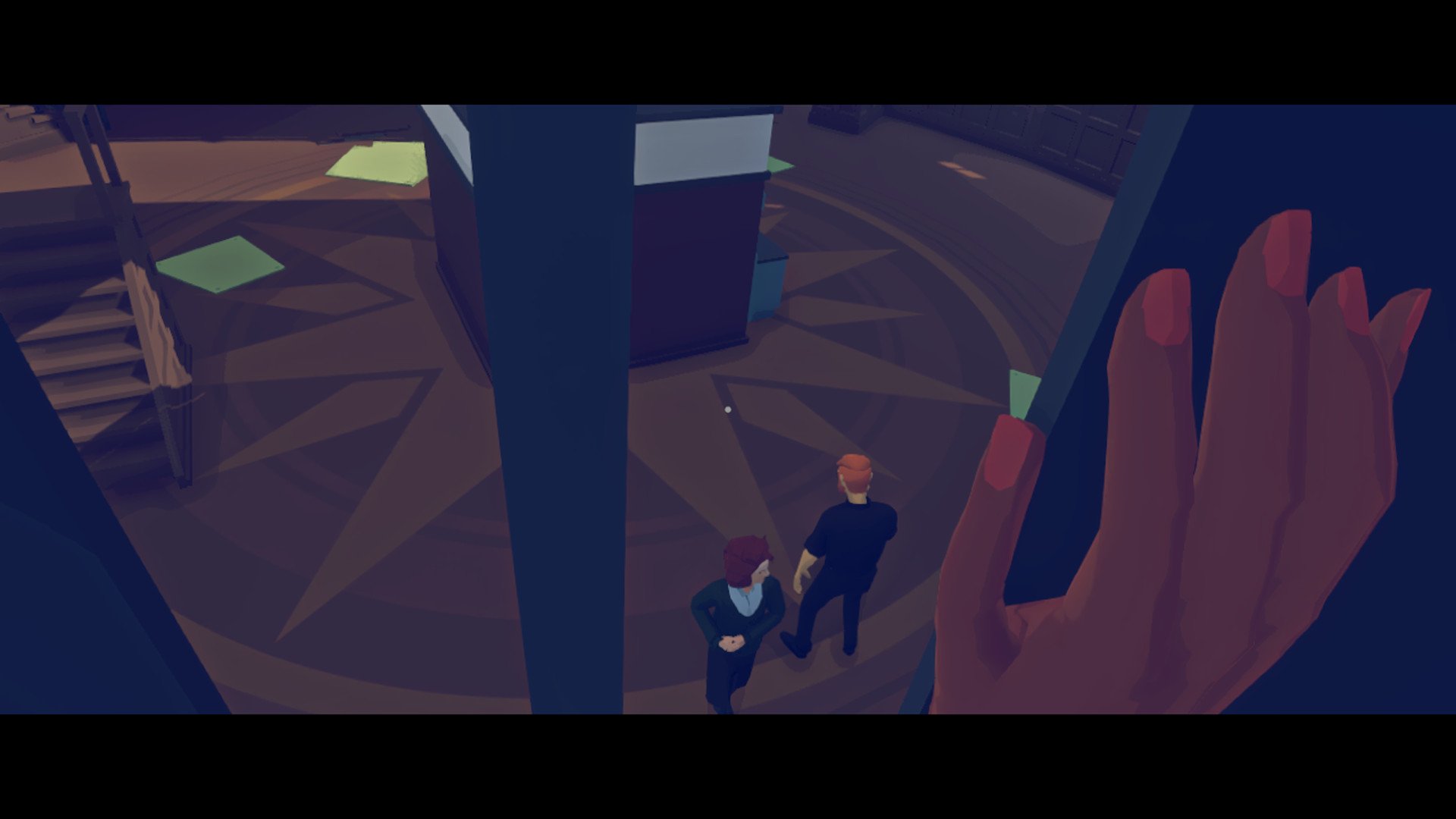
In a second play through, I felt like I was filling in some smaller gaps that I'd wondered about before, but still left with the same overwhelming excitement at how enjoyable it is as a whole, but also deep confusion as to why it even ended the way it did. It's difficult to grasp the concept of "That's all folks!" when as gamers we're so used to having what we want, how we want it.
Games are a reflection of the society we live in; they're made by real people with the same base level needs we do, and they're still people with their visions. Do I love the vision that Variable State had for Virginia? Absolutely! Do I find it incredibly frustrating that I was left with more questions than answers? Absolutely! But that's not the developer's problem if they intended it to be this way. And I believe they did.

There are a lot of little touches in Virginia that obviously have relevance in today's society, but naming them specifically would almost spoil the run of the story itself. Playing as a black woman and having no choice in the matter is also significant. Do you, therefore, start potentially reading too much into the minimal emotional interaction we get from other characters? Most likely, yes. Is there any way of knowing for sure? Unfortunately not.
Go into Virginia with an open mind. At least, if the story is somewhat confusing to get your head around, the scenery and music are enough to get lost in. Sometimes it's easy to forget you're playing a game and you'll be waiting for something else to happen before you realize you're in control again. Often it feels as though such care has been taken to present things so strangely, that I can't tell if it has gone overboard to the point it obscures the entire message. This is probably from being overly ambitious, which is not necessarily a bad thing, as you can tell so much care has gone into animating the characters just so. But I found the body language easier to read than the subtext, put it that way.
Summary
One one hand I loved Virginia — it was quirky and weird; and on the other, I just felt frustrated that I still didn't know what it was all about by the end of multiple plays. There isn't even much to say negatively about it -- it plays fine, if not the camera by default is a little over-sensitive, but this is easily remedied. If you pause the game, the sound effect is so abrupt and jarring, that it immediately pulls you out of the moment. Virginia's biggest downfall is that it tried too hard to deliberately withhold information from the player to the end that they ended up missing the point. If there were ever a sequel to Virginia, I would be all over it like flies on buffalo dung, but for the meantime, I think I need to settle for something a little less mad.
Pros:
- Incredibly replayable story
- Plays out like a movie
- Lack of speech draws the player to pay more attention
- Leaves the player wanting more
Cons:
- The plot jumping around may leave the player more confused than anything
This game review was conducted on Xbox One with a code provided by the developer.


Lauren Relph is a Former Games Writer, focusing on Xbox. She doesn't like piña coladas but loves getting caught in the rain. Follow her on Twitter!
